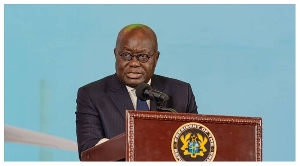Business News of Wednesday, 1 July 2020
Source: goldstreetbusiness.com
No timelines in place for AfCFTA’S delayed take-off
Despite the commitment made to implement Africa Continental Free Trade Area (AfCFTA) despite the outbreak of Coronavirus (COVID-19) which postponed indefinitely the 1st July commencement date, no strategic timelines for start of duty free trading among member states have been made official.
Today should have been an historic day on the African continent regarding the implementation of the world’s largest free trade zone –AfCFTA. However, with the outbreak of the COVID-19 pandemic, African Governments are now engaged in fighting to curb the spread of the disease, with their efforts necessarily focused largely on restrictions on cross border movement.
Currently, the decision on the start of trading under AfCFTA is still being considered by the Assembly of Heads of State of the African Union (AU).
Most business activities that were severely impacted with disease were forced to reschedule to the latter part of the year in anticipation of full business recovery.
A number of trade groups have already urged the AU Commission and the AfCFTA Secretariat to consider implementing the agreement next year. However, some industry analysts are also of the view that with the systematic opening of some countries borders, it has become imperative to give tentative timelines of AfCFTA’s implementation.
Presently, phase one operational instruments required for the start of trading under the agreement are still awaiting approval by Member States.
The operational instruments include Rules of Origin, which will determine the eligibility of goods to be traded under AfCFTA; modalities such as protection of infant industries; and an online negotiating forum to enable member States spearhead the success of the policy.
The remaining are: an online mechanism for monitoring and elimination of non-tariff barriers and AfCFTA mobile application for businesses including digital payments system for goods and services; a Pan-African payment and settlement system; and dashboard of the AU Trade Observatory, all of which are expected to accelerate the implementation of the agreement.
The COVID-19 global health emergency has led to an unprecedented global economic slowdown, with many anticipating a post-Covid-19 global recession.
For instance, the World Trade Organization (WTO) estimates that world merchandise trade could fall by between 12 percent and 32 percent this year. The United Nations Conference on Trade and Development (UNCTAD) also projects that global Foreign Direct Investment inflows will decline by up to 40 percent in 2020, reaching their lowest level in two decades.
According to a COVID-19 Business Survey conducted by the International Trade Centre (ITC), one in four Micro, Small and Medium-sized Enterprises (MSMEs) reports being at risk of shutting down permanently within the next three months.
“Taken together, these threats to global trade, investment, growth, and employment risk derailing progress towards the UN Sustainable Development Goals”, ITC states.













